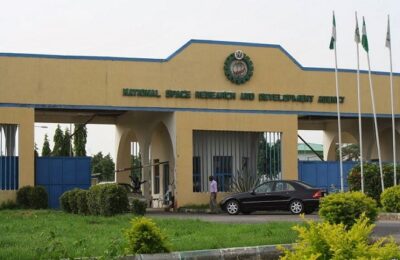Since the appointment of the present Director General of the National Space Research and Development Agency (NASRDA), Dr.Halilu Shaba, by President Mohammadu Buhari, the agency has being thoroughly reformed to meet the expectations of the country.
The agency is now more than ever before, working on the co-operative ways it can partner with the private sector on promoting the the commercialization of the space sector of the country and accelerate the pace of exploration and in the process enhance the economic development of Nigeria.
This is particularly important because the country’s future successes in the space field depends on the restructuring of our approach for financial sustainability.The change in approach becomes inevitable because in reality prior to the systematic changes now been introduce by the new NASRDA administration, we have not been able to bring in the private sector properly into the space field inorder to enhance innovation and in the process achieving a cost saving dispensation that was necessary for progress and developments as against the use of the antiquated and constraining structure that was first developed for exploiring space in the country which is today outdated.
The newly introduced method of the public and private sector partnership and cooperation carries an opportunity cost that has shown the private sector’s willingness and readiness to harness space many viable materials and properties, compared with the pace it could attain with a more market friendly approach. Such transformation could help going forward in solving the problems now militating against the speedy developments of the Nigerian space sector and foster a space sector that can sustain itself financially.
Many space activities have commercial potentials which this reforms for transformation by the new management of NASRDA seeks to enthroned such as;
*Tapping space-based clean energy sources.
*Mining asteroids for useful raw materials.
*Developing safe avenues for scintific experiments.
*Upcycling/Sequesting harzardious but valuable debris currently in space.
*Tapping sources of water already in space to decouple into oxygen and hydrogen for space fuels and oxidizers,and to the provide radiation shielding mass.
*Using the low-gravity,low temperature and other properties of space for many activities,including manufacturing and research.
While this sounds ambitious, it is technologically feasible currently and would allow the private sector to develop pragmatic use of space assets much faster than government provision.This creates a sustainable market-based economy of space that our current approach obstructs.
A commerce-based structure,much as we have in the sea and airspace, in which government provides the legal frameworks where the private sector can flourish will greatly advance our use of outer space environment in maximizing our potentials to pursue such activities.
Allowing the private continue to advance private launch vehicle technology and instead spending public funds on infrastructures, not only drives efficiency but creates a financial self sustaining commercial industry that benefits the country in the long run.
A great deal of low hanging fruits is available,if only we make a whole hearted decision to turn from a merely scouting and near-offshore use of space to being a space faring nation in the nearest possible future.
We all know that this cannot all happen within the current NASRDA’s budget. In this commerce-based approach of the director-general’s, Dr.Halilu Shaba, the private sector develops the space industry and NASRDA and other governments related parties buy transports and other key services such as orbits facilities,as customers of the private providers.
NASRDA as an agency would begin to buy this space transportation just as we currently does with other transportation systems.
Extending this good start and making it more consistent is the only way,, and within the NASRDA’s budgets that leads to comprehensive advancements In space.
Thanks to the present director general who has been credited with doing all he can to reform and correct the fault which lies primarily in the structure of the current system itself, especially the interplay between the legislatures, the private sector companies and NASRDA itself as the regulatory agency charged with maintaining Nigeria’s space capabilities.
The present structure which ties space developments in the country to conflicting political requirements and the failures to fund the space sector adequately,making for sub-optimal decisions by managers, administrators, and politicians must be discarded.
In contrast, changing to a commerce paradigm in which government funds infrastructures lays the foundation for a sustainable space industry in the country.
Today, given a functioning space transportation infrastructure, as the private sector develops the space industry,what space commerce needs from the government is a legal framework in which to operate that defines and defends property rights and research that leads to more diverse space activities.
Taking cue from agreements in the developed world on the various ways nation’s regards the bounty of the seas,our government can ensure a sustainable and equitable free market environments with models from other frontier exploiration, government is advised to focus on creating the legal framework to allow commerce and other endeavours to flourish.
We cannot imagine how profoundly comprehensively and quickly technological advancement-when it is commercialized changes our everyday lives in the country. Every single time, and by orders of magnitude, we underestimate its powers to improve our country one’s it becomes widely used through commercialisation. For example, we cannot all own a jet but majority of the people can afford a flight ticket and this is due to the tangible efforts of the synergy between technology and commerce. the new Director-General, Dr. Halilu Ahmad Shaba is working assiduously hard to introduce this models for the growth of space technology in our country.
– Musa Wada writes from Abuja.




